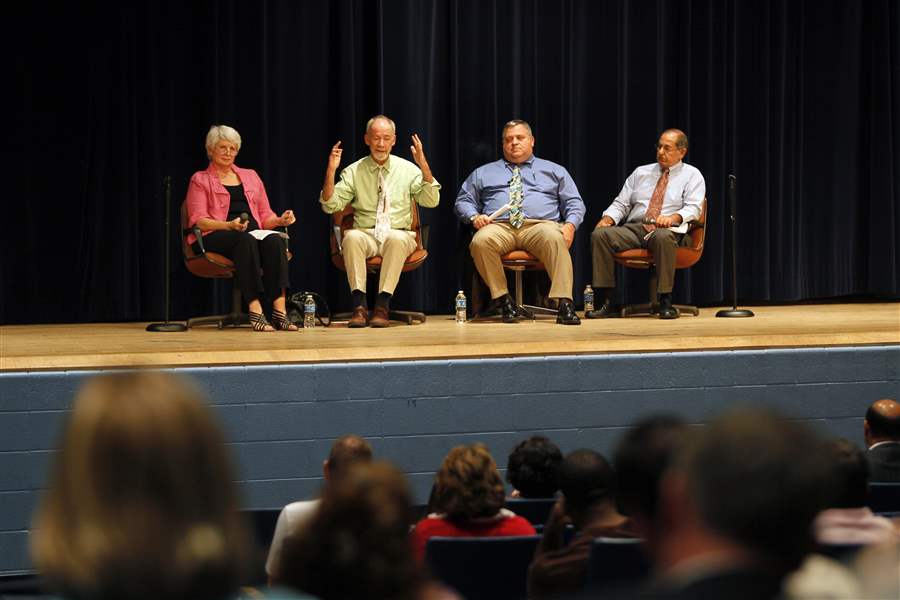
Communicate with your kids, panel tells parents
10/30/2012
From the left, Ann Huss, William Donnely, Don Adamski and William Geha, all local emotional health professionals, talk with parents about risk and resilience in teens at Springfield High School.
THE BLADE/ZACK CONKLE
Buy This Image

From the left, Ann Huss, William Donnely, Don Adamski and William Geha, all local emotional health professionals, talk with parents about risk and resilience in teens at Springfield High School.
A panel of health professionals last week agreed that communication is the key in dealing with problems and issues they face in raising teenagers.
Hosted by Springfield High School in Holland, “Adolescent Well Being ... a Conversation About Risk and Resilience in Teens” allowed parents to hear from counselors and psychologists who work with teenagers everyday.
Bill Donnelly, a psychologist and former clinical director of Children’s Resource Center in Bowling Green, told the audience to remind their sons and daughters about their accomplishments and reinforce the positive things in their lives.
“Listen to your kids. No matter how tired you are,” he said. “Help them to see that their struggles don’t define who they are..... Keep reminding them about the beauty within them.”
Ann Huss, of the Children’s Resource Center, advised parents to pay attention to their gut instincts and intuition if they are uneasy with what their children are doing.
“Be there for your kids and love them,” she said. “Ask those questions and listen to them, and most of all be there and support them.”
Don Adamski, employee/community assistance coordinator with St. Luke’s Hospital, challenged the audience to be have active role in their sons and daughters lives.
“Walk though those doors and ask the questions,” he said.
About 50 people attended the hour-long forum, in which seven questions on issues ranging from alcohol and drug use to depression and suicide were asked to the four panelists. Penta Career Center co-sponsored the event.
One question posed to the experts dealt with the impact that sexual orientation, social economic status, and race may have on bullying and harassment.
Mrs. Huss talked about the need of acceptance for lesbian, gay, bisexual, and transgender teenagers, most importantly from their family.
“They are at four times greater risk for suicide or depression than their heterosexual peers if the child does decide to come out and tell their family about it,” she said. “If they are rejected by their family they are eight times at risk for suicide than gay or lesbian kids who come out and their families embrace them and accept them for who they are.”
Mr. Donnelly cited a Bowling Green State University survey that found that 35 percent of all Wood County high school students had been teased or mocked because of ethnicity, race, or sexual orientation.
He agreed with Mrs. Huss that LGBT youth face more stress than their straight counterparts and are vulnerable to suicide or depression.
“They experience incredible harassment,” Mr. Donnelly said. “Obviously we have a long way to go for our kids in that area.”
Bill Geha, who is intervention and prevention services coordinator for the Sylvania schools, also was on the panel.
--Mark Reiter